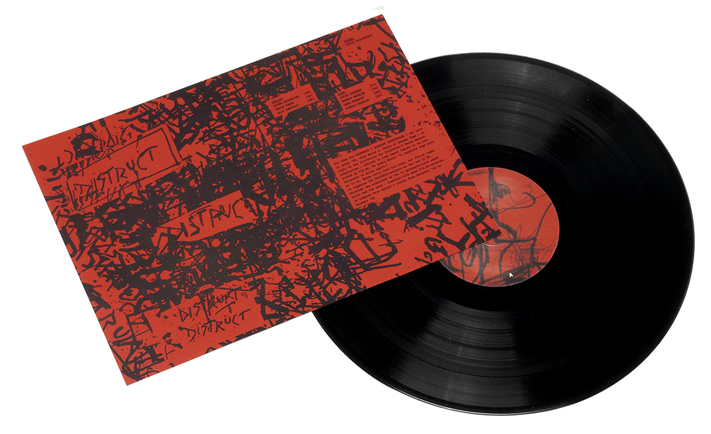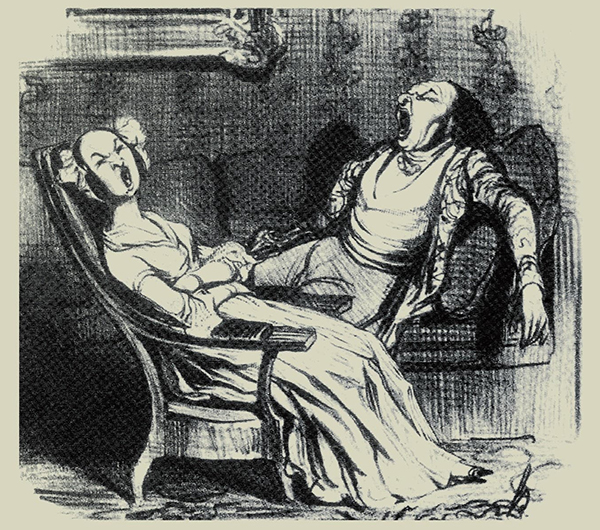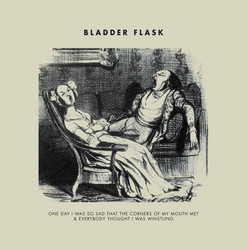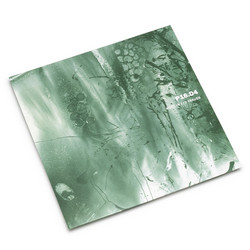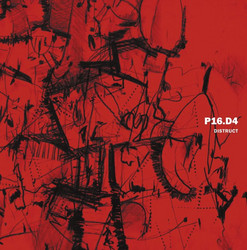Bladder Flask / P16.D4
Since its founding by Franck Laplaine, back in 1998, the French imprint, Sonoris, has constructed a highly individual context of experimental and electroacoustic sound, delivering singular efforts by Steve Roden, Kevin Drumm, Jim O'Rourke, Pascal Comelade, Francisco López, and numerous others. Over the last two and half decades, Sonoris has been primarily focused on releasing contemporary works, but their latest batch takes a rare dive into the past, comprising the first ever vinyl reissues of Bladder Flask’s 1981 LP, “One Day I Was So Sad That the Corners of My Mouth Met and Everybody Thought I Was Whistling”, and P16.D4's 1984 LPs “Distruct” and “Kühe In 1/2 Trauer”. Delving deep into the complex textures of post-industrialism and abstract avant-garde soundscapes, each is an astounding and truly standalone effort - long overdue for historical reappraisal - that laid the groundwork for so much of what was to come.
Bladder Flask "One Day I Was So Sad That the Corners of My Mouth Met and Everybody Thought I Was Whistling" (1981)
Appearing toward the beginning of the 1980s, Bladder Flask were a loosely knit collective of musicians who were all active, playing in numerous projects, within underground circles in the UK during this period, including Nigel Jacklin (Alien Brain), Richard Rupenus (The New Blockaders, Alien Brains) John Mylotte (Citipati, Metgumbnerbone), Philip Rupenus (Alien Brains, Citipati, Metgumbnerbone, The New Blockaders) and Sean Breadin (Citipati, Metgumbnerbone). Taking on elements of Fluxus, Dada, Improv, and Sound Art, Bladder Flask was a project entirely of its moment, distilling the liberated energy and creative freneticism of punk and post-punk, the expanded sound palette and contentiousness of industrial, and radical experimentation of electroacoustic music and musique concrète. Retrospectively, it’s been described as having been “possessed by some fevered desire to surpass the worst excesses of the lunatic fringe”.
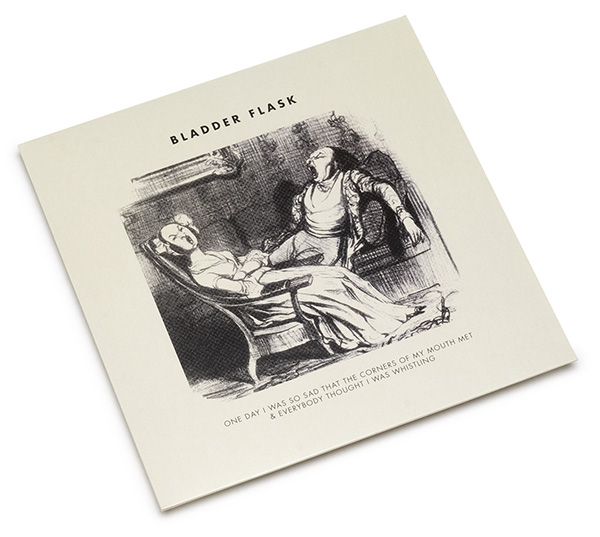
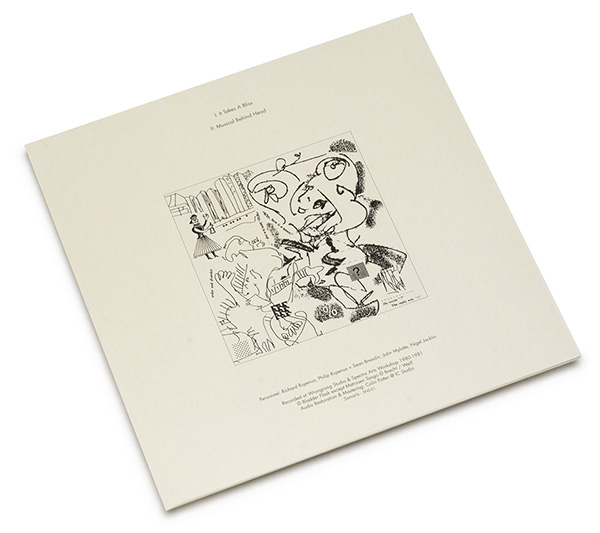
While many of the members would go on to work together in numerous projects over the ensuing years, “One Day I Was So Sad That the Corners of My Mouth Met and Everybody Thought I Was Whistling” - self-released on their own imprint, Orgel Fesper Music, in 1981 - is the lone document of their activities. Often sounding more like the experiments of a madcap composer at GRM or EMS, or some mind-bending soundtrack to BBC children’s program gone awry, rather than the output of the English post-industrial scene, the LP is a writhing tapestry of warbling tape loops and murmurs, electronic textures, and heavily processed sounds of unknown origin.
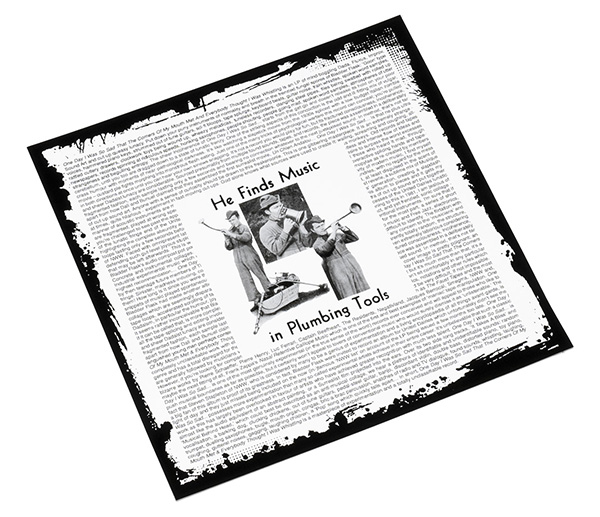
It’s no wonder, immediately after its release, that it caught the ear of Nurse With Wound’s Steven Stapleton, who proclaimed «I love Bladder Flask's “One Day I Was So Sad That the Corners of My Mouth Met and Everybody Thought I Was Whistling” and what a great title, perhaps my favorite ever. I must have listened to the album so much in the '80s. I listened to it again recently and it was like welcoming an old friend.» In fact, so deep was Stapleton’s passion that Bladder Flask was offered a place on NWW’s United Dairies imprint, to release of follow up. Sadly, it was not to be. One can only imagine, had the project’s lone LP been released slightly earlier, it surely would have made the legendary NWW list.
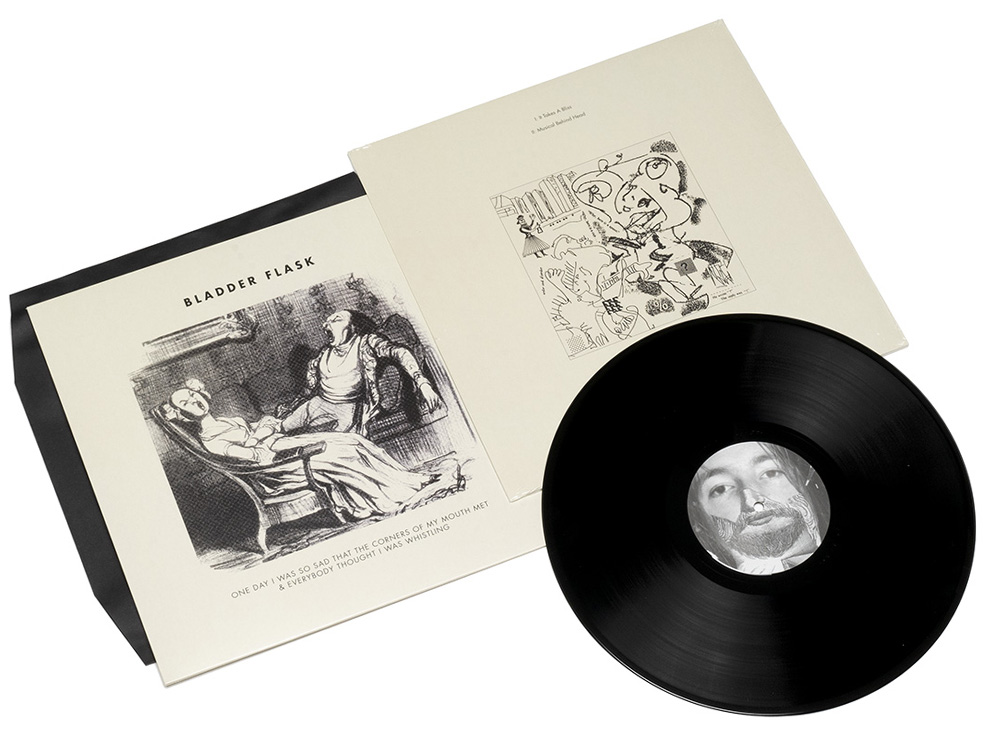
Out of print on vinyl since its original 1981 release, Sonoris’ first ever reissue of Bladder Flask’s “One Day I Was So Sad That the Corners of My Mouth Met and Everybody Thought I Was Whistling” takes great steps toward properly contextualizing one of the UK’s most unique and visionary projects of its era. Stepping firmly into the experimental avant-garde, it equally illuminates how radical the post-industrial scene actually was. Issued as a beautiful, limited-edition LP with fully restored audio, once heard it can’t help but blow minds.
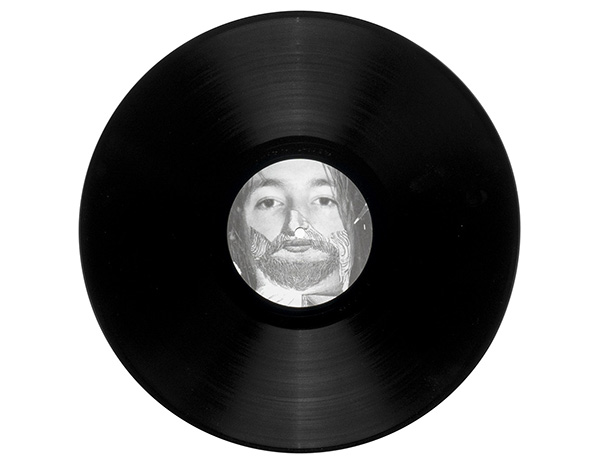
P16.D4 "Kühe In 1/2 Trauer" (1984)
Active between 1980 to 1988, P16.D4 represents a near perfect counterpoint to Bladder Flask’s activities in the UK, displaying similar temperaments unfolding on the other side of Europe in Germany, and representing a node within an interconnected network of artists to which the aforementioned also belonged. A rotating collective of sound artists, electronic, and noise musicians that expanded and contracted around the core membership of Ewald Weber, Ralf Wehowsky, Roger Schönauer, Stefan E. Schmidt, and Ewald Weber, P16.D4 deployed tape cut-ups, musique concrète, endless recycling, and transformation of previously published material to produce an entirely unique body of work, as well as embarking upon numerous long-distance collaborations with like-minded artists like DDAA, Die Tödliche Doris, Vortex Campaign, Nocturnal Emissions, Bladder Flask, Nurse With Wound, and Merzbow.
Between 1981 and 1989, P16.D4 produced six full lengths of remarkable material. The first two, “Wer Nicht Arbeiten Will Soll Auch Nicht Essen!” and “V.R.N.L.” were produced in small cassette editions, laying the foundations for their first two LPs, “Kühe In 1/2 Trauer” and “Distruct”, both originally issued by Selektion - an interdisciplinary sound collective and publishing platform - in 1984, and now reissued on vinyl for the first time by Sonoris.
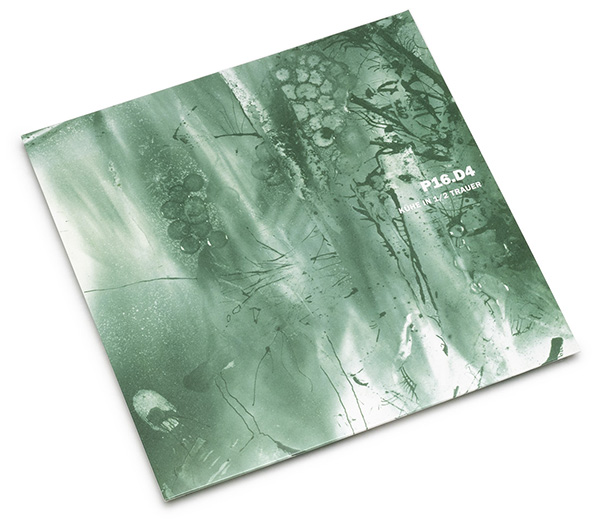
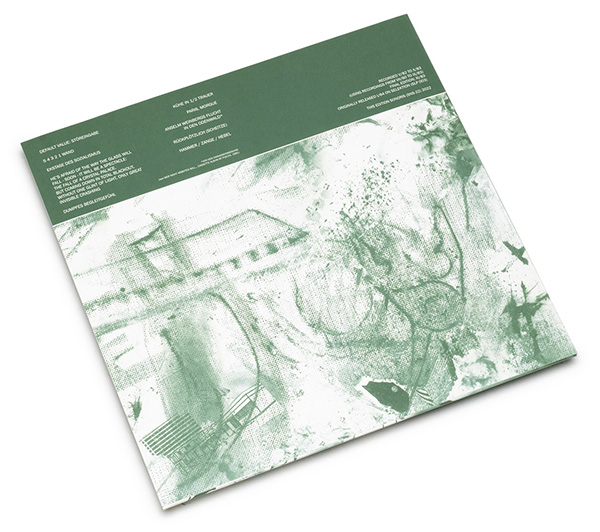
While P16.D4’s first two albums had been raucous gestures of left-field post punk, a couple of years down the road in 1984, “Kühe In 1/2 Trauer” encountered the collective entering far more experimental realms, weaving avant-garde soundscapes from electronics, tape-loops, and wild improvisations on acoustic instruments. Rather than being understood as an extension of the post-industrial scene, the album might be better regarded as belonging to and and effort to revitalize the idiom of sound art, imbuing it with new subversive and dangerous meanings that resonated more closely with the temperaments of punk.
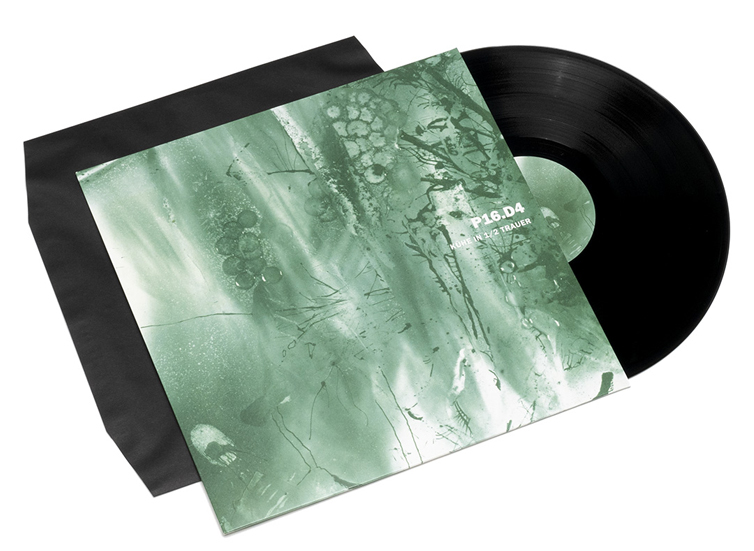
Covering a fairly substantial range of the material across its two sides, the collective dances between pieces were looped choirs bubble from blankets of throbbing pulses, drones, and feedback, and clanging and clattering expanses, gestures of musique concrète, and unconventional improvisations, to collectively achieve one of the most unexpected efforts of late 20th Century experimentalism that we can call to mind.
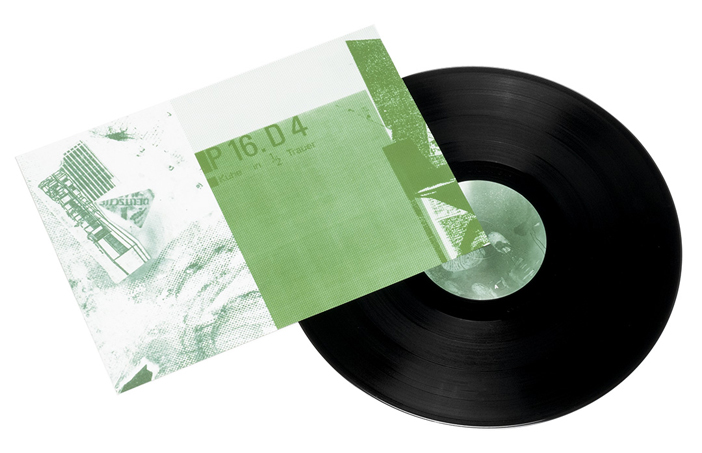
P16.D4 "Distruct" (1984)
Active between 1980 to 1988, P16.D4 represents a near perfect counterpoint to Bladder Flask’s activities in the UK, displaying similar temperaments unfolding on the other side of Europe in Germany, and representing a node within an interconnected network of artists to which the aforementioned also belonged. A rotating collective of sound artists, electronic, and noise musicians that expanded and contracted around the core membership of Ewald Weber, Ralf Wehowsky, Roger Schönauer, Stefan E. Schmidt, and Ewald Weber, P16.D4 deployed tape cut-ups, musique concrète, endless recycling, and transformation of previously published material to produce an entirely unique body of work, as well as embarking upon numerous long-distance collaborations with like-minded artists like DDAA, Die Tödliche Doris, Vortex Campaign, Nocturnal Emissions, Bladder Flask, Nurse With Wound, and Merzbow.
Issued later the same year, P16.D4’s “Distruct” is arguably the best through which to catch a glimpse of the spirit of open ended collaboration at the project’s core, drawing in equal parts from their involvement with Selektion, the broader collective to which its members belonged that was dedicated to using, distorting, and alienating a vast range of sonic material, often not of their own making. Each of the album's tracks is effectively a long-distance collaboration with one or more of some of the most noted names in post-industrial music of the era: Nurse With Wound, Nocturnal Emissions, Die Tödliche Doris, Onnyk (Yoshiaki Kinno), Bladder Flask, Haters, Merzbow, Hiroki Kocha, Vortex Campaign, etc.
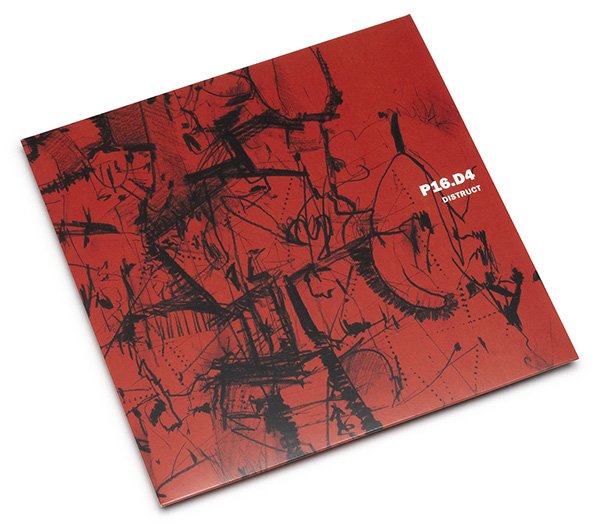
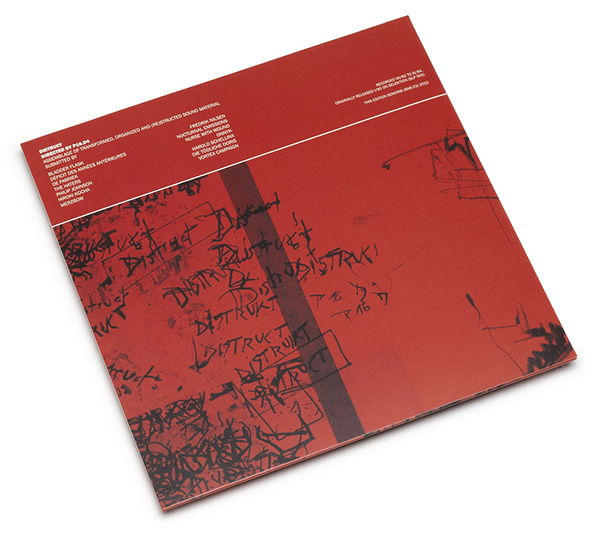
Taking a radical approach that foreshadowed modes of long-distance collaboration and communication that wouldn’t become the norm until three or four decades later, P16.D4’s “Distruct” is a hybrid of conversations that span culture and time, weaving the contributions of likeminded artists into their own wild methods of creativity and construction. Ranging from full throttle passages of distorted noise, howls of unknown origin, blasting improvisations that border on free jazz, and spacious movements of almost minimal abstraction, the sum total is a stunning and truly visionary expanse of sound, taking avant-gardism into a brand-new era were the very notion of the composer would finally be offered an unceremonious death.
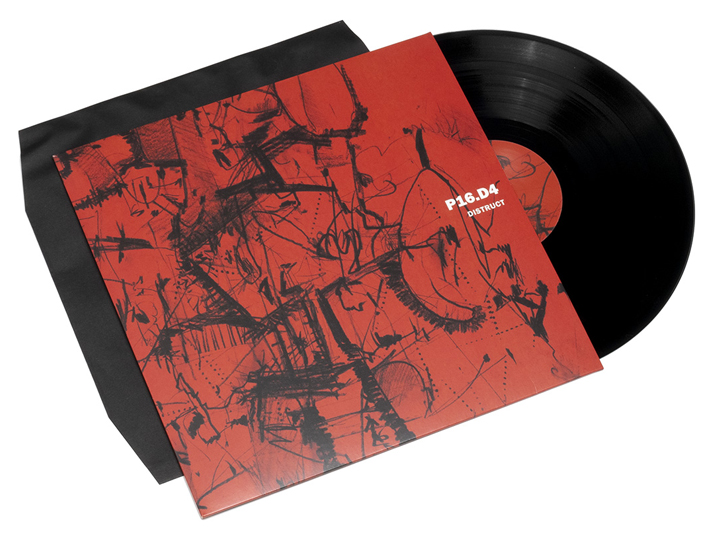
Vital and alive, complex and abstract, and yet remarkably approachable and engrossing, both P16.D4’s “Kühe In 1/2 Trauer” and “Distruct” entirely rewrite longstanding perceptions of how sophisticated a great deal of post-industrial music actually was. This is not the music of contentious punks, but rather focused avant-gardists on a mission to alter the world through sound. Like Sonoris’ Bladder Flask reissue, both of these reissues are the first ever to repress these seminal efforts of vinyl since their original release, and fully illuminate how radical the post-industrial scene actually was. Issued as beautiful, limited-edition LPs with fully restored audio, we highly recommend you grab all three. Once the word gets out, they’re not going to sit around for long.
